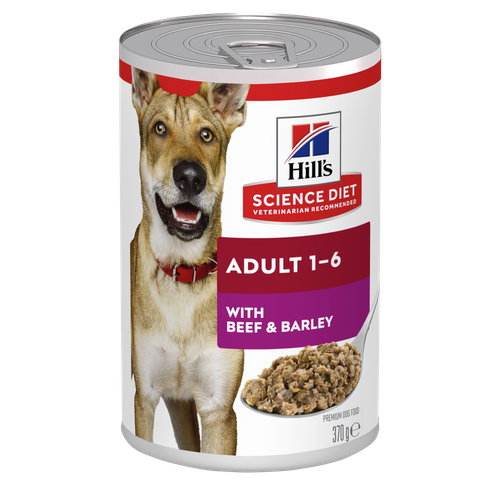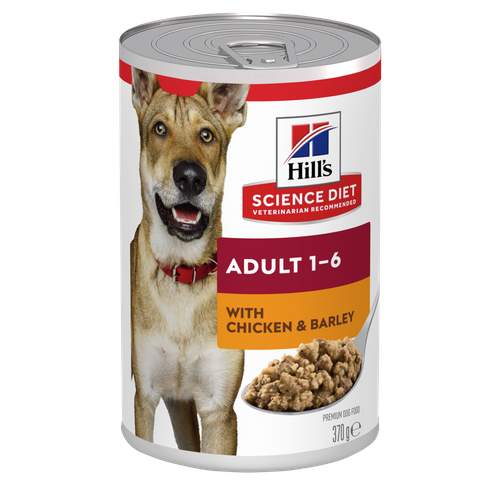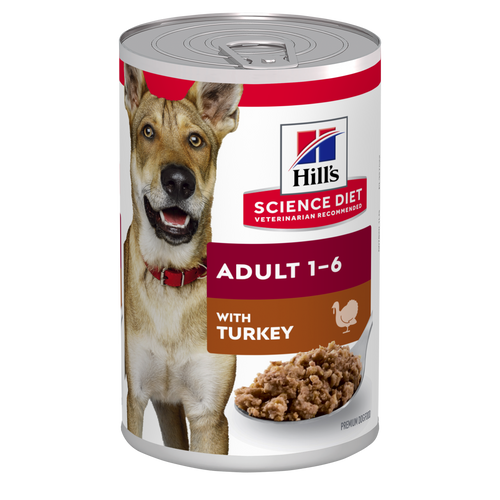
-
Find the right food for your petTake this quiz to see which food may be the best for your furry friend.Find the right food for your petTake this quiz to see which food may be the best for your furry friend.Health CategoryFeatured products
 Adult with Beef & Barley Dog Food
Adult with Beef & Barley Dog FoodBeef & Barley recipe with precisely balanced nutrition to keep Adult dogs active and healthy
Shop Now Adult with Chicken & Barley Wet Dog Food
Adult with Chicken & Barley Wet Dog FoodChicken & Barley recipe with precisely balanced nutrition to keep Adult dogs active and healthy
Shop Now Adult with Turkey Wet Dog Food
Adult with Turkey Wet Dog FoodTurkey & Barley recipe with precisely balanced nutrition to keep Adult dogs active and healthy
Shop NowFeatured products Adult 7+ Tender Tuna Dinner Cat Food
Adult 7+ Tender Tuna Dinner Cat FoodWith delicious chunks in a decadent gravy
Shop Now Sensitive Stomach & Skin Chicken & Beef Dinner
Sensitive Stomach & Skin Chicken & Beef DinnerGourmet daily nutrition, carefully made. Tasty chunks with chicken & beef in a decadent gravy. Supports digestive health, nourishes skin and promotes a lustrous fur.
Shop Now Adult Chicken & Spinach Casserole Cat Food
Adult Chicken & Spinach Casserole Cat FoodWith delicious chunks in a decadent gravy
Shop Now -
DogCat
- Cat Tips & Articles
-
Health Category
- Weight
- Skin & Food Sensitivities
- Urinary
- Digestive
- Kidney
- Dental
- Serious Illness
-
Life Stage
- Kitten Nutrition
- Adult Nutrition
Featured articles Water
WaterWater is the most important nutrient of all and essential for life. Animals can lose almost all their fat and half their protein and still survive, but if they lose 15% of their water, it will mean death.
Read MoreHill's Australian Bushfire EffortsRead More Pet Food Storage Tips
Pet Food Storage TipsWhere you store your cat and dog food can make a big difference in the quality and freshness once it is opened. Here are some common questions and recommendations for optimal storage for all of Hill’s dry and canned cat and dog food.
Read More -


Is your dog not feeling so well? Could he be suffering from one of the many digestive problems in dogs? If he's vomiting or you notice problems with his stools, he may be suffering from issues with his gastrointestinal or digestive system.
Gastrointestinal problems in dogs happen for a variety of reasons, and any one of them may cause your dog to not feel well. Did he eat something new? If he ingested something other than dog food, he may be allergic, intolerant, unable to digest it, or even worse, it could have given him an infection. Also, some breeds, such as German shepherds, Great Danes, and Schnauzers, are more prone to digestive issues.
Here are seven digestive problems in dogs you should be aware of. It is important to learn about what could make your dog sick, so you can prevent it. Also, if gastrointestinal problems in dogs are already plaguing your pet, you'll learn what you can do to help.
1. Diarrhea
You may notice that your dog is having loose, liquid stools. Diarrhea is a common ailment for dogs and other animals and is caused by many different things. Here's a list of a few different reasons diarrhea occurs:
- stress
- spoiled/rotten food
- allergies to specific ingredients in foods
- changing dog foods too quickly
- internal parasites
- infections
- failing organs
2. Small intestinal malabsorption
Malabsorption is a type of digestive problem in dogs. If your dog is experiencing small intestine malabsorption, it means he either isn't digesting his food, or he isn't absorbing the vitamins and minerals after digestion.
3. Colitis
Colitis, an inflammation of the membrane lining of the colon, is among the common digestive problems in dogs. It also inflames the large intestine, so your dog may experience painful stools or diarrhea. The inflammation and irritation can be either chronic or acute.
Whipworms can be the cause for colitis. Also, if your dog is suffering from tumors or polyps, they may also irritate the colon, causing colitis. A change in food, ingesting something other than food, or an allergy to a specific food is often the culprit for a colitis attack.
4. Acute gastroenteritis
Usually a temporary issue, acute gastroenteritis causes inflammation in the stomach or intestines. It usually occurs when a dog eats high-fat or spoiled food. It can also occur if a dog eats anything poisonous or something he is allergic to. Internal parasites can be a harbinger to gastroenteritis. Stress is another trigger.
5. Hemorrhagic gastroenteritis
Similar to acute gastroenteritis, hemorrhagic gastroenteritis is usually a temporary issue, but it can be fatal if untreated. Hemorrhagic gastroenteritis causes severe vomiting and bloody stools, usually in diarrhea. It can be brought on by ingestion of foods or substances that your dog shouldn't be eating or is allergic to, as well as pancreatitis and other autoimmune illnesses.
6. Pancreatitis
Pancreatitis is an infection or inflammation of the pancreas. The reasons why pancreatitis occurs are unknown, though high-fat food may be to blame. Other issues that may cause the condition include trauma to the pancreas, infections, or a disease.
7. Exocrine pancreatic insufficiency
Exocrine pancreatic insufficiency occurs when your dog's pancreas fails to produce enough digestive enzymes. Weight loss, an increase in appetite, and large, soft stools are the major symptoms. If you've noticed an extreme weight loss in your dog, he may not be producing enough enzymes in his pancreas.
How can you help?
Know your dog's baseline
Digestive problems in dogs can appear suddenly, so always be on the lookout for ways to protect your pet. The best way you can take care of your dog is knowing what his normal behavior and health looks like. How many times a day does your dog normally defecate? What do his stools generally look like? While gross to think about, and even more so to monitor, it can be a very vital piece in maintaining your dog's health. Talk to your vet more about what a dog's stool should look like when healthy to better understand what to look for if you notice abnormalities in your dog's behavior. Does he ever throw up? While vomiting doesn't always scream a larger digestive issue, it is one of the more common signs that something is wrong. If you notice this happening frequently, it is a good time to get your pup to the vet to have him checked out. How much does he eat and drink? These are all questions you need to know the answer to, so that you can identify when something is wrong.


Tasty Tips

Monitor what your dog eats at all times
Make sure your dog receives well-balanced nutrition and doesn't come in contact with any food he shouldn't be eating. At the same time, don't let your dog swallow anything he isn't supposed to, even if it's not food. Certain plants or foreign objects will make your dog extremely ill.
Healthy and easily digestible dog food will go a long way for an anxious dog's belly. Also, regular preventative trips to the veterinarian will keep you on top of any health issues your dog may be facing.
Keep your dog hydrated
A dog suffering from a gastrointestinal or digestive issue needs to stay hydrated, especially if he is vomiting or has diarrhea. One thing to keep in mind: If you notice that your dog begins drinking less frequently and less water or he is lapping it up in an extreme amount, it's a sign that something is amiss. Being well-hydrated is a key to keeping your dog healthy.
Be supportive and calming
Gastrointestinal problems in dogs can be upsetting for the entire family. Your once happy, playful dog is suddenly lethargic, withdrawn, and possibly vomiting or ill with diarrhea. Because stress can cause digestive problems, try to keep your dog calm and well-adjusted. In times of high stress, you may notice your dog having more stomach issues. Find coping mechanisms that work for your dog, such as petting him or scratching his belly.
Contact your veterinarian
If you even suspect that your dog is suffering from a digestive or gastrointestinal issue, contact your vet immediately. Many of these conditions are serious, and your dog will need to be monitored closely, and possibly be treated with medications.
In the case that your dog is suffering at night or on the weekend, don't wait until the vet office is open. Consider visiting an urgent care facility.


Erin Ollila believes in the power of words and how a message can inform—and even transform—its intended audience. Her writing can be found all over the internet and in print, and includes interviews, ghostwriting, blog posts, and creative nonfiction. Erin is a geek for SEO and all things social media. She graduated from Fairfield University with an M.F.A. in Creative Writing. Reach out to her on Twitter @ReinventingErin or learn more about her at http://erinollila.com.
Related products

Supports lean muscle for dogs who prefer smaller kibble

Supports healthy joints, lean muscle, and beautiful coat for large breed dogs

Supports energy level and beautiful coat in mature dogs who prefer smaller kibble

Clinically proven kibble technology to reduce plaque & tartar build-up, specially designed for small & mini dogs
Related articles

Extra pounds can cause problems for your dog's overall health. Learn the signs that your dog might be overweight, and what you can do to manage its weight.

As small and toy breed dogs age, their nutritional needs change.

Learn how today's wet dog food blends have gotten a face lift, and how you'll provide your dog the nutrition he needs in the form he loves.

Selecting the right food for your puppy is a key to quality nutrition and a long, healthy life., Learn more about how to select the right puppy food.

Put your dog on a diet without them knowing
Our low calorie formula helps you control your dog's weight. It's packed with high-quality protein for building lean muscles, and made with purposeful ingredients for a flavorful, nutritious meal. Clinically proven antioxidants, Vitamin C+E, help promote a healthy immune system.
Put your dog on a diet without them knowing
Our low calorie formula helps you control your dog's weight. It's packed with high-quality protein for building lean muscles, and made with purposeful ingredients for a flavorful, nutritious meal. Clinically proven antioxidants, Vitamin C+E, help promote a healthy immune system.

